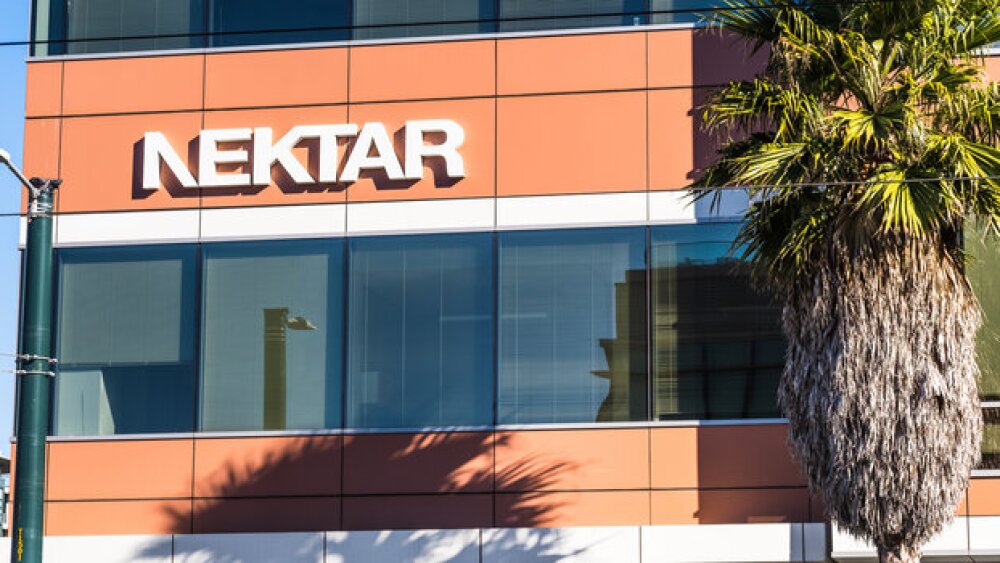In a lawsuit filed Monday, Nektar Therapeutics accused Eli Lilly of scheming to ensure rezpegaldesleukin would not succeed after acquiring a competing medicine.
Pictured: Nektar signage at its headquarters in California/iStock, Sundry Photography
The drug development breakup between Nektar Therapeutics and Eli Lilly got even more acrimonious Monday as multiple outlets reported that the former is suing the latter, with Nektar accusing its former partner of breach of contract, negligent misrepresentation and unfair competition.
In 2017, Nektar and Lilly inked a deal to co-develop rezpegaldesleukin (rezpeg) to treat various autoimmune diseases, with a focus on eczema. In the lawsuit, filed in a San Francisco federal court on Monday and obtained by STAT News, Nektar claimed that after acquiring Dermira and its competing atopic dermatitis drug, Lilly “executed on a scheme to ensure that rezpeg would never succeed.”
Nektar additionally accused Lilly of “botching” the data analysis of the drug’s early trials, delaying “the development and commencement of additional trials” and “fabricating excuses for why the drug was not likely to be a commercial success.” The company goes on to accuse Lilly of “gross negligence and/or intentional misconduct” in the supervision and execution of the Phase II eczema study.
In a statement sent to BioSpace Tuesday, a Lilly representative said that “the decision to terminate the collaboration with Nektar was based on the totality of evidence” related to rezpeg, including results from a Phase II trial in systemic lupus erythematosus in which the candidate failed to hit the primary endpoints. The representative called the decision not to further develop the asset “data driven.”
Nektar declined to comment for this story.
Original story published Aug. 7
Nektar Flags Lilly’s Miscalculations in Rezpeg Atopic Dermatitis Trials
Nektar Therapeutics on Monday revealed that former partner Eli Lilly had incorrectly calculated efficacy data for its investigational regulatory T-cell stimulator rezpegaldesleukin (rezpeg), which the company is developing as a treatment for atopic dermatitis.
At the 31st Congress of the European Academy of Dermatology and Venereology (EADV), held in September 2022, Lilly presented data from a Phase Ib study of rezpeg, showing that while the candidate elicited positive and dose-dependent improvements in key efficacy measures, these effects ultimately fell short of statistical significance.
At 12 weeks, Lilly erroneously reported the 12-µg/kg and 24-µg/kg doses of rezpeg were associated with a 53% and 66% improvement in Eczema Area and Severity Index (EASI) scores, respectively, whereas placebo induced a 49% improvement relative to baseline, Nektar reported. Neither dose was significantly superior to placebo, according to the company.
However, Nektar’s re-analysis demonstrated that at the highest dose level, rezpeg treatment led to an 83% improvement in EASI scores at 12 weeks, which was statistically better than placebo with a p-value of 0.002, according to the company. In addition, the corrected data also showed a higher proportion of patients achieving a 75% reduction in EASI scores from baseline.
Nektar’s corrected analysis reveals “that rezpeg, a novel and differentiated T regulatory cell mechanism, holds great promise for treating patients with atopic dermatitis,” CEO Howard Robin said in a statement.
Rezpeg is a novel, first-in-class molecule that targets the IL-2 receptor complex to selectively stimulate the multiplication of regulatory T-cells, in turn addressing the immune dysregulation that underpins many autoimmune and chronic inflammatory disorders.
Lilly and Nektar signed a strategic collaboration in July 2017 to co-develop rezpeg. However, in April 2023—following the miscalculated data presented at EADV 2022—Lilly backed out of the alliance and returned all rights to rezpeg back to Nektar.
After regaining control over the rezpeg program, the California biotech was able to access raw data files from the Phase Ib study, which it then reviewed and turned over to an independent statistical firm for validation.
The re-analysis also flagged miscalculations made by Lilly regarding another Phase Ib study, with corrections revealing a stronger treatment effect of rezpeg on the Psoriasis Area and Severity Index score. Nektar said it has already informed Lilly’s internal statistical and clinical teams of the errors and the pharma giant confirmed these mistakes through written communications.
Beyond atopic dermatitis, the Lilly-Nektar partnership also studied the potential of rezpeg in systemic lupus erythematosus. In February 2023, however, the candidate failed the Phase II ISLAND trial, unable to outperform placebo at improving SLEDAI-2K scores. This stumble forced Lilly to forego its Phase III plans in this indication and factored into its decision to return rezpeg to Nektar.
Going forward, Nektar said it will announce a new study design for the Phase IIb study of repzeg in biologic-naïve patients with moderate to severe atopic dermatitis who have progressed on topical corticosteroids. The study is slated to begin in October 2023.
Tristan Manalac is an independent science writer based in Metro Manila, Philippines. He can be reached at tristan@tristanmanalac.com or tristan.manalac@biospace.com.





